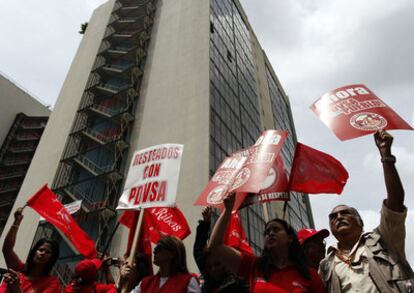Protests ignite across Venezuela after US imposes sanctions
Analysts believe move will help Chávez rally supporters for 2013 race
Just a day after Washington imposed sanctions against Venezuela's state oil company Petroleos de Venezuela (Pdvsa) for its dealings with Iran, thousands of pro-Chávez supporters took to the streets of Caracas and other cities demanding their government take action against the United States.
"These are illegal, abusive measures taken by this weak government of the United States. [...] Those most affected are businesspeople of the United States," Foreign Minister Nicolás Maduro said in an interview on state television last Wednesday.
On May 24, the US State Department announced that it was sanctioning Pdvsa, as well as six other companies from Monaco, Syria, Belarus and China, for defying a US ban on dealings with Iran by providing it with gasoline and other petroleum products. The law is aimed at pressuring Tehran into dropping its nuclear program.
Between December 2010 and March 2011, Pdvsa delivered at least two cargoes of reformate - a blending component used to improve gasoline - to Iran, worth approximately $50 million, US officials say.
The sanctions bar Pdvsa from seeking US government contracts, obtaining US export licenses, and securing financing from the US Export-Import Bank, officials say. It does not affect the flow of an estimated 1.2 million barrels a day of Venezuelan crude oil to the United States.
Addressing a cheering crowd on Sunday, Venezuelan Oil Minister and Pdvsa head Rafael Ramírez said that the United States "hit us with everything they had."
Ramírez said that while shipments of heavy crude to Pdvsa's US-based subsidiaries would continue, the company cannot guarantee shipments to nonaffiliated private oil companies.
"Our industry has the capability to face and overcome this attempt at sanctions," Maduro was reported as saying by the Associated Press. "What they're trying to do with the sanctions is hit us from an economic point of view."
Maduro also said that cutting oil supplies to the United States would only be considered "in extreme moments."
Still, many analysts believe it is an unlikely scenario. "The relationship between the two countries is mutually dependent," Bret Rosen, a Latin America sovereign-debt analyst at Standard Chartered told Dow Jones on Monday. "The US needs Venezuelan oil and Venezuela needs the US export market."
Others see it as fuel for Chávez to stir up more anti-US rhetoric ahead of next year's presidential elections. "Chávez is using this as a weapon to consolidate his base, to put the opposition in an uncomfortable situation and to rally support for his election campaign," Aníbal Romero, a Caracas-based retired professor of political science, also told Dow Jones.

Tu suscripción se está usando en otro dispositivo
¿Quieres añadir otro usuario a tu suscripción?
Si continúas leyendo en este dispositivo, no se podrá leer en el otro.
FlechaTu suscripción se está usando en otro dispositivo y solo puedes acceder a EL PAÍS desde un dispositivo a la vez.
Si quieres compartir tu cuenta, cambia tu suscripción a la modalidad Premium, así podrás añadir otro usuario. Cada uno accederá con su propia cuenta de email, lo que os permitirá personalizar vuestra experiencia en EL PAÍS.
¿Tienes una suscripción de empresa? Accede aquí para contratar más cuentas.
En el caso de no saber quién está usando tu cuenta, te recomendamos cambiar tu contraseña aquí.
Si decides continuar compartiendo tu cuenta, este mensaje se mostrará en tu dispositivo y en el de la otra persona que está usando tu cuenta de forma indefinida, afectando a tu experiencia de lectura. Puedes consultar aquí los términos y condiciones de la suscripción digital.








































